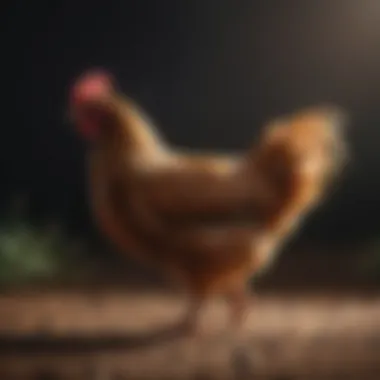Discovering the Ultimate Chicken Varieties: An In-Depth Guide


Animal Species Profile
While embarking on the exciting journey of exploring the best chickens - a comprehensive guide that will enlighten both seasoned farmers and novices - it is crucial to first grasp the fundamental aspects of chicken species. Chickens, scientifically known as Gallus gallus domesticus, are domesticated fowls that showcase a diverse range of breeds, each with unique characteristics and traits. These feathered creatures vary in size, color, and plumage patterns, making them a fascinating subject for poultry enthusiasts worldwide.
Physical Characteristics and Appearance
Chickens exhibit a myriad of physical traits that set them apart from one another. From the vibrant, flamboyant feathers of the Polish breed to the stout and robust build of the Orpington, each breed boasts distinct features. Some chickens flaunt distinctive crests or muffs, while others sport elegant tails and fancy colored plumage. Understanding the physical characteristics of different chicken breeds is essential for aspiring chicken keepers to select the right fit for their farm or backyard setup.
Natural Habitat and Distribution
In their natural habitat, wild junglefowls, the ancestors of modern chickens, roamed the jungles of Southeast Asia. Through domestication over centuries, chickens have spread globally, adapting to diverse climates and environments. While some breeds thrive in cold climates with dense feathering for insulation, others are better suited to hot regions, sporting sleek feathers for efficient regulation of body temperature. Awareness of a breed's natural habitat and distribution can aid in providing appropriate care and housing for chickens in domestic settings.
Behavior and Social Interactions
Chickens are social beings that exhibit complex behaviors within their flocks. They establish intricate hierarchies, known as pecking orders, to maintain order and resolve conflicts. Communication among chickens involves a variety of vocalizations, body language cues, and subtle movements to convey messages within the flock. Understanding chicken behavior is essential for creating a harmonious environment, promoting social interactions, and ensuring the overall well-being of these fascinating avian creatures.
Introduction to Chickens
Within the realm of poultry farming, the introduction to chickens serves as the foundational cornerstone for all aspects that follow. Understanding the breeds, characteristics, and functionalities of chickens is paramount to successful poultry husbandry. This segment will shed light on the diverse world of chickens, from common breeds to specialized varieties, enlightening prospective chicken enthusiasts about the possibilities and responsibilities that come with chicken keeping.
An Overview of Chicken Breeds
Popular Breeds for Beginners
Delving into the realm of popular chicken breeds for beginners unveils a landscape of familiarity and ease of management. The breeds highlighted in this section cater to novice chicken keepers, offering traits like docility, high egg production, and adaptability to various environments. Novices often find comfort in breeds like the Rhode Island Red, known for their robustness and consistent egg-laying capabilities. Understanding the nuances of each breed's temperament, egg-laying capacity, and physical attributes enables beginners to make informed decisions when selecting their feathered companions.
Specialized Breeds for Farming Purposes
Contrary to breeds tailored for beginners, specialized chicken breeds target individuals looking to delve into commercial poultry production. These breeds boast specific traits such as rapid growth, efficient meat production, or superior egg quality. Examples include the Cornish Cross for meat production and the Leghorn for prolific egg-laying. Evaluating the unique characteristics and potential drawbacks of specialized breeds equips farmers with the knowledge required to optimize their poultry operations effectively.
Unique and Rare Chicken Varieties
Exploring unique and rare chicken varieties opens up a realm of exclusivity and intrigue within the poultry world. These breeds often possess distinctive physical features, temperaments, or historical significance. Engaging with breeds like the Ayam Cemani, known for their striking black plumage, allows keepers to appreciate the diversity and beauty of chicken breeds beyond the mainstream options. Embracing the rarity and challenges associated with these breeds adds a layer of excitement and reverence to the art of chicken keeping.
Benefits of Raising Chickens
Egg Production
The aspect of egg production stands as a pivotal benefit of raising chickens, offering a fresh and sustainable source of protein. Chickens renowned for their egg-laying prowess contribute to household nutrition and self-sufficiency. Understanding the factors that influence egg production, such as nutrition, environmental conditions, and breed selection, empowers keepers to maintain a consistent and reliable egg supply for personal consumption or commercial purposes.
Natural Pest Control
Harnessing chickens for natural pest control aligns with the concept of integrated pest management, reducing the reliance on chemical agents. Chickens exhibit keen foraging instincts, targeting insects, larvae, and weeds in their surroundings. Integrating chickens into garden spaces or agricultural settings aids in pest reduction organically, promoting a symbiotic relationship between poultry and the ecosystem.
Organic Fertilizer
One of the lesser-known benefits of raising chickens lies in their role as providers of organic fertilizer. Chicken manure, a nutrient-rich byproduct of poultry keeping, serves as an excellent soil amendment for enhancing plant growth and soil fertility. Implementing proper manure management practices ensures that chickens contribute positively to sustainable agriculture while minimizing environmental impacts.
Choosing the Right Chicken Breed


Choosing the right chicken breed is a crucial decision for any poultry enthusiast. It sets the foundation for a successful and fulfilling chicken-keeping experience. In this section, we will delve into the intricacies of selecting the perfect breed tailored to your unique needs and preferences. Understanding the specific characteristics, benefits, and considerations of each breed is paramount in ensuring a harmonious backyard flock.
Factors to Consider
Climate Adaptability
Climate adaptability plays a significant role in the overall health and well-being of chickens. Different breeds thrive in varied climate conditions, making it essential to choose a breed that can withstand the environmental challenges of your region. A key characteristic of climate adaptability is the ability of certain breeds to cope with extreme temperatures, be it hot summers or cold winters. This adaptability ensures resilience and longevity, making it a popular choice for chicken keepers looking for sustainable breeds that can thrive in diverse weather conditions.
Space Requirements
Considering space requirements is imperative when selecting a chicken breed. The amount of space needed for each breed to roam, exercise, and socialize varies, influencing the overall health and happiness of the flock. Understanding the space requirements of different breeds allows for proper planning of coop size and outdoor run dimensions. This consideration ensures that the chickens have ample room to express their natural behaviors, promoting physical and psychological well-being.
Temperament
The temperament of a chicken breed plays a crucial role in the dynamics of the flock and the ease of handling and interaction. Some breeds are known for their docile and friendly nature, making them ideal for families or first-time chicken owners. On the other hand, certain breeds exhibit more independent or flighty behaviors, requiring careful management and handling techniques. Understanding the temperament of each breed aids in creating a harmonious flock dynamic and fosters positive interactions between chickens and keepers.
Popular Choices for Backyard Flocks
Rhode Island Red
Rhode Island Reds are a popular choice for backyard flocks due to their exceptional egg-laying abilities and hardy nature. Known for their efficient production of brown eggs, these chickens are well-suited for small-scale egg production operations. Their adaptability to various climates and friendly demeanor make them a valuable addition to any backyard flock.
Barred Plymouth Rock
Barred Plymouth Rocks are renowned for their classic appearance and gentle disposition. Their striking barred plumage and proficient egg-laying capabilities make them an attractive choice for both novice and experienced chicken keepers. With their calm temperament and reliable egg production, Barred Plymouth Rocks are a staple in backyard flocks.
Buff Orpington
Buff Orpingtons are beloved for their fluffy, golden plumage and docile temperament. These chickens are excellent dual-purpose breeds, excelling in both egg production and meat quality. Their calm and friendly nature makes them a favorite among families and backyard chicken enthusiasts. Buff Orpingtons are sought after for their all-around qualities and endearing personalities.
Exotic and Ornamental Breeds
Silkie
Silkies are intriguing ornamental breeds known for their unique appearance and exceptional broodiness. Their silk-like feathers, black skin, and blue earlobes set them apart from traditional chicken breeds. Silkies are gentle and nurturing, making them excellent mothers and charming additions to ornamental flocks.
Ayam Cemani
Ayam Cemani chickens are prized for their mystical all-black appearance, from feathers to internal organs. Revered for their rarity and exotic appeal, these Indonesian chickens are considered sacred in their native land. Ayam Cemani's distinctive features and elegant demeanor make them captivating choices for enthusiasts seeking extraordinary and visually striking breeds.
Polish Chicken
Polish chickens are known for their eccentric crest of feathers and elegant carriage. These ornamental birds come in a variety of colors and patterns, adding a whimsical touch to any flock. While Polish chickens may require extra care due to their head feathers obstructing vision, their charming personality and aesthetic value outweigh the minor inconveniences. Polish chickens are ideal for those looking to infuse flair and character into their poultry collection.
Housing and Care Requirements
In this all-encompassing guide to exploring the best chickens, the section on Housing and Care Requirements is of paramount importance. Proper housing and care are critical elements in ensuring the health, well-being, and productivity of chickens. The way in which chickens are housed and cared for directly impacts their growth, egg production, and overall happiness. By providing a conducive living environment and ensuring proper care, chicken owners can promote optimal conditions for their feathered friends.
Coop Design and Maintenance
Space Considerations


Space considerations are a crucial aspect of coop design and maintenance. Allocating adequate space for chickens to move around freely is vital for their physical and mental well-being. The recommended space per chicken varies depending on the breed and size, with factors such as room for roosting, nesting, and feeding stations needing to be taken into account. A spacious coop allows chickens to exhibit natural behaviors, reduces stress, and enhances egg production.
Ventilation and Lighting
Proper ventilation and lighting play integral roles in maintaining a healthy coop environment. Adequate ventilation ensures the flow of fresh air, preventing the build-up of harmful gases and moisture that can lead to respiratory issues. Additionally, sufficient natural or artificial lighting helps regulate the chickens' circadian rhythms, promoting healthy sleeping patterns and overall well-being. Properly ventilated and well-lit coops contribute to optimal chicken health and productivity.
Predator Protection
Protecting chickens from predators is a top priority in coop design and maintenance. Predators pose a significant threat to the safety of chickens, including theft of eggs, injury, or even loss of life. Implementing predator-proof measures such as secure fencing, sturdy locks, and predator deterrents like motion-activated lights or alarms helps safeguard chickens against potential threats. Prioritizing predator protection ensures a secure and stress-free environment for chickens to thrive.
Feeding and Nutrition
Ensuring proper feeding and nutrition is essential for the well-being and productivity of chickens. A balanced diet is a cornerstone of good health and optimal performance in chickens. By providing a well-rounded diet that meets their nutritional requirements, chicken owners can support healthy growth, strong egg production, and overall vitality.
Balanced Diet Guidelines
Balanced diet guidelines outline the necessary nutrients and proportions needed for a chicken's diet. A mix of quality poultry feed, grains, greens, and grit helps meet the protein, carbohydrates, vitamins, and minerals essential for chicken health. Customizing diets based on age, breed, and seasonal requirements ensures chickens receive adequate nutrition for their specific needs, promoting overall health and longevity.
Treats and Supplements
In addition to a balanced diet, treats and supplements can be used to provide additional nutrients and enrichment for chickens. Treats such as fruits, vegetables, mealworms, or seeds offer variety and mental stimulation for chickens. Supplements like calcium or probiotics can address specific nutritional deficiencies or support digestive health. When used judiciously, treats and supplements can enhance the diet and well-being of chickens.
Common Health Issues
Being aware of common health issues in chickens is crucial for proactive care and management. Respiratory infections, parasites, and nutritional deficiencies are among the prevalent health concerns that chicken owners may encounter. By recognizing early signs of illness, maintaining good hygiene practices, and providing timely veterinary care when needed, chicken owners can safeguard the health and vitality of their flock. Knowledge of common health issues empowers chicken keepers to promote a thriving and resilient chicken community.
Breeding and Reproduction:
Breeding and Reproduction are pivotal aspects in the realm of chicken keeping, playing a crucial role in the sustainability and development of poultry populations. Understanding the intricacies of breeding and reproduction is imperative for those aiming to establish healthy and productive flocks. Efficient breeding practices can lead to the selection of traits that enhance egg production, overall health, and desirable characteristics in chickens. Therefore, this section delves into the methods and considerations essential for successful breeding and reproduction.
Incubation Process:
Egg Collection and Storage:
Egg Collection and Storage is a fundamental stage in the incubation process, ensuring the viability of eggs for hatching. Proper egg collection techniques involve handling eggs with care to prevent damage to the delicate shells and to maintain their freshness. Storing the eggs in a cool and humid environment is crucial to preserve the eggs' integrity and to prevent bacterial contamination. Effective egg collection and storage practices contribute significantly to the overall success of incubation, as they dictate the initial quality of embryos to be nurtured during development.
Candling Techniques:
Candling, an essential technique in incubation, involves the use of a candling light to observe the internal contents of an egg to monitor embryo development. This method aids in identifying potential issues such as infertile eggs or embryonic abnormalities early in incubation. By shining the candling light through the eggshell, chicken keepers can assess the embryo's growth progress and make informed decisions regarding the viability of the egg for hatching. Candling techniques serve as a reliable tool in ensuring the selection of healthy embryos for successful incubation and hatching.
Hatching and Caring for Chicks:
Hatching and Caring for Chicks mark the culmination of the incubation process, requiring attentive care and proper nurturing techniques. Timely intervention and assistance may be necessary during the hatching stage to aid chicks struggling to emerge from their shells. Once hatched, chicks must be provided with a warm and secure environment, access to food and water, and protection from potential stressors. Providing adequate care and transitioning the chicks seamlessly from the incubator to brooder play a vital role in their early development and well-being.
Selective Breeding Practices:
Maintaining Genetic Diversity:
Maintaining Genetic Diversity is a crucial component of selective breeding practices, ensuring the preservation of varied genetic traits within poultry populations. Genetic diversity safeguards against potential genetic disorders and enhances overall population resilience. By incorporating diverse genetic lineages in breeding programs, chicken breeders can develop robust and adaptable breeds capable of thriving in various environmental conditions.


Breeding for Desired Traits:
Breeding for Desired Traits allows chicken keepers to selectively breed individuals with specific characteristics or attributes to enhance desired traits within the flock. By focusing on traits such as egg productivity, temperament, or physical appearance, breeders can selectively propagate genes that align with their breeding objectives. Thoughtful selection and breeding practices contribute to the development of high-quality strains tailored to meet particular standards or purposes.
Health Considerations:
Health Considerations play a paramount role in selective breeding, influencing the overall well-being and disease resistance of poultry stocks. Prioritizing health considerations in breeding programs involves ensuring the responsible selection of breeding pairs, implementing comprehensive health screenings, and maintaining optimal living conditions for breeding birds. By emphasizing health considerations in breeding practices, chicken breeders can establish resilient and vigorous breeding lines capable of producing healthy offspring.
Section 5: Health and Wellness Measures
In the domain of chicken keeping, ensuring the health and wellness of your flock reigns supreme. This section of the comprehensive guide emphasizes the indispensable nature of prioritizing health-related measures in poultry husbandry. By addressing common diseases, ailments, and proactive strategies, chicken owners can optimize the well-being and longevity of their feathered companions. It equips enthusiasts with the knowledge and tools to preemptively tackle health issues before they escalate, emphasizing a proactive rather than reactive approach to chicken care.
Common Diseases and Ailments
Respiratory Infections
Respiratory infections constitute a paramount concern in chicken health. This subsection delves into the distinct attributes of respiratory infections, elucidating their impact on the overall wellness of chickens. By unpacking key symptoms, transmission factors, and treatment protocols, readers gain a holistic grasp of combating respiratory ailments in poultry. Understanding the nuances of respiratory infections equips chicken keepers with the requisite insights to promptly identify, address, and prevent these conditions, safeguarding flock health and vitality.
Parasites and Worms
Parasites and worms pose significant threats to the well-being of chickens. By spotlighting the intricacies of these silent adversaries, this segment sheds light on the detrimental effects of parasitic infestations on flock health. Delving into lifecycle stages, symptoms, and mitigation strategies, readers garner comprehensive knowledge on combating parasitic intruders within poultry settings. Empowered with preventive measures and treatment options, chicken enthusiasts can fortify their flocks against the pernicious influences of parasites and worms.
Illness Prevention Strategies
The segment underscores the pivotal role of preventive practices in averting common illnesses among chickens. By delineating best practices for maintaining sanitization, biosecurity, and vaccination compliance, this subsection champions a proactive stance in disease management. An exploration of dietary considerations, coop hygiene, and environmental controls arms readers with a well-rounded arsenal to bolster flock immunity and resilience. Implementing these prevention strategies not only mitigates health risks but also fosters a culture of vigilance and care in the realm of chicken husbandry.
Vaccination Protocols
Recommended Vaccines
Navigating the landscape of recommended vaccines is crucial for upholding optimal health standards in chicken populations. This section dissects popular vaccines, detailing their efficacy, administration guidelines, and disease coverage scope. By elucidating the significance of routine vaccinations in preventing viral outbreaks and bolstering immune defenses, readers gain profound insights into safeguarding flock health. Recognizing the value of specific vaccines empowers chicken keepers to make informed decisions regarding immunization strategies, nurturing robust and disease-resistant flocks.
Administration Techniques
Efficient administration of vaccines plays a pivotal role in ensuring their efficacy and potency. This subsection delves into optimal techniques for vaccine delivery, underscoring the significance of dosage precision, injection sites, and post-vaccination monitoring. By elucidating procedural nuances and best practices, readers equip themselves with the proficiency to administer vaccines accurately and minimize potential risks or complications. Mastering administration techniques not only optimizes vaccine outcomes but also cultivates a culture of proficiency and care among poultry enthusiasts.
Veterinary Care Importance
Recognizing the integral role of veterinary care in poultry management is paramount for sustaining optimal health outcomes. This segment accentuates the value of regular check-ups, diagnostic screenings, and professional guidance in preserving flock well-being. By emphasizing the need for collaborative partnerships with avian veterinarians, readers appreciate the impact of expert intervention in enhancing health outcomes and mitigating risks. Prioritizing veterinary care establishes a foundation of accountability and expertise, elevating the standard of care and welfare for chickens while ensuring comprehensive health management in poultry settings.
Conclusion: A World of Chicken Possibilities
In the vast world of chicken keeping, the conclusion section serves as a vital component, encapsulating the essence of the entire guide. It acts as a culmination of all discussions, highlighting the endless possibilities and opportunities that come with raising chickens. This final segment emphasizes the importance of not only starting but also sustaining a thriving chicken community. By focusing on the key aspects discussed throughout the guide, individuals can truly grasp the multifaceted nature of chicken rearing.
Embracing the Joy of Chicken Keeping
Building a Strong Flock Community
Delving into the concept of building a robust flock community sheds light on the interconnectedness and social structure within the world of chicken keeping. The aspect of fostering a strong flock community plays a pivotal role in ensuring the well-being and harmony among the chickens. It emphasizes the significance of social bonds and hierarchy within a group of chickens. By understanding and promoting a healthy flock dynamic, chicken keepers can enhance the overall welfare and productivity within their coop.
A Sustainable Approach to Poultry Farming
Exploring a sustainable approach to poultry farming is crucial in the contemporary context of environmental awareness and resource conservation. This aspect emphasizes the implementation of eco-friendly practices, efficient resource utilization, and waste reduction in chicken rearing. By adopting sustainable methods, not only do chicken keepers contribute to environmental preservation, but they also ensure the long-term viability of their poultry operations. It underscores the importance of balancing economic viability with environmental responsibility in poultry farming.
Continued Learning and Exploration
The journey of chicken keeping is a continuous learning experience, marked by endless exploration and discovery. This aspect underscores the importance of being open to new information, techniques, and advancements in the field of poultry. By fostering a culture of continuous learning, chicken keepers can stay abreast of best practices, emerging trends, and innovation in chicken husbandry. It encourages a growth mindset and a proactive approach to adapting to the evolving landscape of chicken farming, facilitating continuous improvement and success in poultry endeavors.







